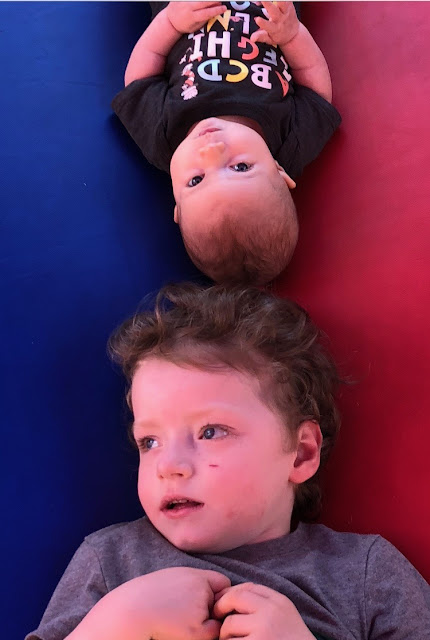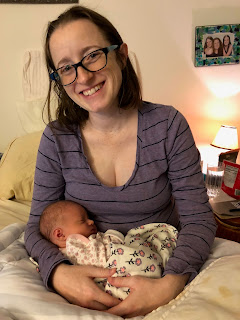The day Eliana and I were discharged from the hospital, we were also pushing (via phone and text mostly) for Cyrus to be discharged from his hospitalization as well. The team’s original goal for discharge for Cyrus had been for him to make it 24 hours on room air without any oxygen desaturation events. This proved to be especially difficult, because it turns out that Cyrus often desats during and after a seizure. This was probably occurring before the pneumonia, but we didn’t have any way of knowing so none of us really could determine what Cyrus’s baseline even was. It could be that even Cyrus’s baseline would not meet that criteria. In any case, it was clear that our criteria for discharge needed to change, but the pulmonologists on the team disagreed on what the new criteria should be.
One of the doctors wanted to get him as stable as possible, needing almost no breathing support at home. They argued that with a newborn at home and with me recovering from surgery, that they weren’t confident that we could meet Cyrus’s needs at home, and that if we couldn’t during this critical recovery period, it could result in a regression or relapse of the pneumonia.
The other pulmonologist wanted to get Cyrus out of the hospital as quickly as possible, now that he was stable again even if he was not completely better to reduce the chance of him getting (more) secondary infections while in the hospital. This pulmonologist also seemed to think that us being able to take Cyrus home would actually be less stressful for us, even with a newborn at home. I was inclined to agree, but when you miss rounds, you don’t have as much ability to sway care decisions (or you have to wait 24 hours for your input to get shared to the with the whole team).
They ended up compromising. Cyrus ended up staying one more day to insure he was remaining stable, and then we were told that they would be sending the hospital home with us in the form of a bunch of respiratory equipment so we could administer his breathing treatments ourselves. The lead pulmonologist told us that Cyrus is at high risk for respiratory issues and that it was a good idea for us to have access to this equipment in general, but that it was easier to justify to insurance companies while he was ill.
Cyrus was so excited to be home! He relished in being on the floor and able to move around freely. Bringing him home before he had completely recovered definitely felt like the right call. Though when we put him in his shake vest and strapped him into his wheelchair for that first breathing treatment, he looked so betrayed. But alas, he needed the breathing support.
A breathing treatment for Cyrus involves him spending 20 minutes in a shake vest, while simultaneously breathing in albuterol with a nebulizer, and then going through 15 repetitions of cough assist. All of this punctuated by suctioning as needed.
The shake vest is basically just a blow-up vest hooked up to a vacuum that pumps air in and out, to make his chest vibrate. The idea is to loosen up all the fluid in his lungs, so it is easier to suction up or cough out. The albuterol is called a bronchodilator, and it basically causes the tissue in his lungs to open (dilate) more so that it can absorb more oxygen. The cough assist is the most traumatic of them all in my opinion, as it involves sealing a mask over the mouth and nose, forcing air into his lungs, and then pulling it back out hard enough that it makes him stick out his tongue involuntarily. But all of it in combination, helps to get the gunk out, or close enough to out that you can suction it out.
We were also given a pulse oximeter (measures oxygen levels in your bloodstream) so we can better assess when a breathing treatment is needed, and an oxygen concentrator, which just pulls oxygen from the air and creates a more concentrated version of it, so we can give oxygen to him when he needs it (without having canisters delivered regularly to our door).
So, we are adding amateur respiratory therapist to our list of ever-developing medical skills.
We started with three breathing treatments a day, which was rough for Cyrus because it meant an extra two hours in the wheel chair a day doing an activity that he absolutely did not enjoy. But man, any moment that he is on the floor, he has been thrilled! It’s like being stuck in the hospital, and to a lesser extent trapped in the chair, makes him appreciate the time where he is free so very much!
Each week, we’ve weaned him down by another treatment. And last week he was supposed to be off completely, but by day three he sounded congested and was super low energy again, so we hooked him up to the pulse oximeter, and he was dropping down to 89/90 every few minutes (being like 95 inbetween). And honestly, I don’t think this is lingering pneumonia. Because I’ve seen him get like this before. I feel like occasionally he just aspirates too much and slows down for a few days. Or it could be seizures causing desat events as well as was happening in the hospital. I just didn’t have the ability to check his O2 levels and we didn’t have anything to do to help him when he got like this.
So, now it’s cool that we can check and that there’s something to be done about it on bad days as we now have a mini hospital in our closet. It’s not cool that he clearly has some respiratory issues in general that seem to stick and hover around. But I guess it’s a good thing that we’re learning to recognize desats (like he gets really pale – you almost don’t need the O2 monitor) in addition to seizures so we are more equipped to take care of him than ever!
General Update:
As mentioned, Cyrus has been in a great mood since coming home from the hospital three weeks ago. And this behavior has lingered, which has been delightful to be around. His seizures have been unpredictable and inconsistent. He’s had days here and there with no seizures, which honestly is the first time in months. But inbetween, he’ll have five seizures or two or three pretty significant ones that last 2-3 minutes (and completely wipe him out).
This week, Cyrus suffered a relapse of C. difficile. This bacteria’s resurgence was likely caused by the broad-spectrum antibiotics used to treat his pneumonia. Basically, the antibiotics wiped out most of his gut bacteria, making it easier for the C. difficile (antibiotic resistant) to take over once again. Repeated episodes of blood in his stool caused a bit of panic on my part and I reached out to his pediatrician, the complex care clinic, and the GI clinic all at once for guidance. Eventually everyone responded with slightly conflicting medication schedules an advice. Haha! Now, we get to attempt to sort through that. If this medication does not have lasting effects, we may be exploring the possibility of a fecal transplant. I swear, it’s never a dull moment! (I would love some dull moments!)
And Eliana is doing her job of eating, sleeping, and putting on weight. She’s definitely pretty loud when she wants something, and I feel has desensitized me a bit to Cyrus’s fussing, because his complaining is so mild compared to hers. In the last few days she’s become far more expressive where she just makes the cutest faces! She also seems to have learned the routine. For example, I always change her diaper before eating. So now, she stays calm during the diaper change if she’s hungry because she knows what’s coming next!
Kyle has made it back to work, and I have continued to gain back my mobility and independence, though going out by myself still feels like a monumental task. I can do it though. Since I have weight lifting restrictions, Kyle has been mostly taking care of Cyrus, and I have mostly been taking care of Elli. But we’re making strides in spending time all together in the same room rather than being exiled in separate ends of the apartment.
Cyrus seems very interested in Eliana. He coos at her when she cries, reaches for her when she’s on the ground with him, and one day last week he became noticeably upset when she left him (to go eat because the child is voracious!) on the floor by himself. In turn, when she’s on the floor she’s always watching him. It’s cool to witness.


























